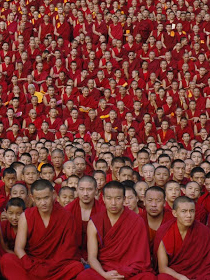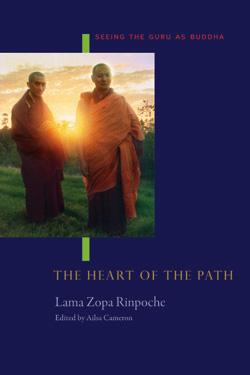- Home
- FPMT Homepage
Foundation for the Preservation of the Mahayana Tradition
The FPMT is an organization devoted to preserving and spreading Mahayana Buddhism worldwide by creating opportunities to listen, reflect, meditate, practice and actualize the unmistaken teachings of the Buddha and based on that experience spreading the Dharma to sentient beings. We provide integrated education through which people’s minds and hearts can be transformed into their highest potential for the benefit of others, inspired by an attitude of universal responsibility and service. We are committed to creating harmonious environments and helping all beings develop their full potential of infinite wisdom and compassion. Our organization is based on the Buddhist tradition of Lama Tsongkhapa of Tibet as taught to us by our founders Lama Thubten Yeshe and Lama Thubten Zopa Rinpoche.
- Willkommen
Die Stiftung zur Erhaltung der Mahayana Tradition (FPMT) ist eine Organisation, die sich weltweit für die Erhaltung und Verbreitung des Mahayana-Buddhismus einsetzt, indem sie Möglichkeiten schafft, den makellosen Lehren des Buddha zuzuhören, über sie zur reflektieren und zu meditieren und auf der Grundlage dieser Erfahrung das Dharma unter den Lebewesen zu verbreiten.
Wir bieten integrierte Schulungswege an, durch denen der Geist und das Herz der Menschen in ihr höchstes Potential verwandelt werden zum Wohl der anderen – inspiriert durch eine Haltung der universellen Verantwortung und dem Wunsch zu dienen. Wir haben uns verpflichtet, harmonische Umgebungen zu schaffen und allen Wesen zu helfen, ihr volles Potenzial unendlicher Weisheit und grenzenlosen Mitgefühls zu verwirklichen.
Unsere Organisation basiert auf der buddhistischen Tradition von Lama Tsongkhapa von Tibet, so wie sie uns von unseren Gründern Lama Thubten Yeshe und Lama Thubten Zopa Rinpoche gelehrt wird.
- Bienvenidos
La Fundación para la preservación de la tradición Mahayana (FPMT) es una organización que se dedica a preservar y difundir el budismo Mahayana en todo el mundo, creando oportunidades para escuchar, reflexionar, meditar, practicar y actualizar las enseñanzas inconfundibles de Buda y en base a esa experiencia difundir el Dharma a los seres.
Proporcionamos una educación integrada a través de la cual las mentes y los corazones de las personas se pueden transformar en su mayor potencial para el beneficio de los demás, inspirados por una actitud de responsabilidad y servicio universales. Estamos comprometidos a crear ambientes armoniosos y ayudar a todos los seres a desarrollar todo su potencial de infinita sabiduría y compasión.
Nuestra organización se basa en la tradición budista de Lama Tsongkhapa del Tíbet como nos lo enseñaron nuestros fundadores Lama Thubten Yeshe y Lama Zopa Rinpoche.
A continuación puede ver una lista de los centros y sus páginas web en su lengua preferida.
- Bienvenue
L’organisation de la FPMT a pour vocation la préservation et la diffusion du bouddhisme du mahayana dans le monde entier. Elle offre l’opportunité d’écouter, de réfléchir, de méditer, de pratiquer et de réaliser les enseignements excellents du Bouddha, pour ensuite transmettre le Dharma à tous les êtres. Nous proposons une formation intégrée grâce à laquelle le cœur et l’esprit de chacun peuvent accomplir leur potentiel le plus élevé pour le bien d’autrui, inspirés par le sens du service et une responsabilité universelle. Nous nous engageons à créer un environnement harmonieux et à aider tous les êtres à épanouir leur potentiel illimité de compassion et de sagesse. Notre organisation s’appuie sur la tradition guéloukpa de Lama Tsongkhapa du Tibet, telle qu’elle a été enseignée par nos fondateurs Lama Thoubtèn Yéshé et Lama Zopa Rinpoché.
Visitez le site de notre Editions Mahayana pour les traductions, conseils et nouvelles du Bureau international en français.
Voici une liste de centres et de leurs sites dans votre langue préférée
- Benvenuto
L’FPMT è un organizzazione il cui scopo è preservare e diffondere il Buddhismo Mahayana nel mondo, creando occasioni di ascolto, riflessione, meditazione e pratica dei perfetti insegnamenti del Buddha, al fine di attualizzare e diffondere il Dharma fra tutti gli esseri senzienti.
Offriamo un’educazione integrata, che può trasformare la mente e i cuori delle persone nel loro massimo potenziale, per il beneficio di tutti gli esseri, ispirati da un’attitudine di responsabilità universale e di servizio.
Il nostro obiettivo è quello di creare contesti armoniosi e aiutare tutti gli esseri a sviluppare in modo completo le proprie potenzialità di infinita saggezza e compassione.
La nostra organizzazione si basa sulla tradizione buddhista di Lama Tsongkhapa del Tibet, così come ci è stata insegnata dai nostri fondatori Lama Thubten Yeshe e Lama Zopa Rinpoche.
Di seguito potete trovare un elenco dei centri e dei loro siti nella lingua da voi prescelta.
- 欢迎 / 歡迎
简体中文
“护持大乘法脉基金会”( 英文简称:FPMT。全名:Foundation for the Preservation of the Mahayana Tradition) 是一个致力于护持和弘扬大乘佛法的国际佛教组织。我们提供听闻,思维,禅修,修行和实证佛陀无误教法的机会,以便让一切众生都能够享受佛法的指引和滋润。
我们全力创造和谐融洽的环境, 为人们提供解行并重的完整佛法教育,以便启发内在的环宇悲心及责任心,并开发内心所蕴藏的巨大潜能 — 无限的智慧与悲心 — 以便利益和服务一切有情。
FPMT的创办人是图腾耶喜喇嘛和喇嘛梭巴仁波切。我们所修习的是由两位上师所教导的,西藏喀巴大师的佛法传承。
繁體中文
護持大乘法脈基金會”( 英文簡稱:FPMT。全名:Found
ation for the Preservation of the Mahayana Tradition ) 是一個致力於護持和弘揚大乘佛法的國際佛教組織。我們提供聽聞, 思維,禪修,修行和實證佛陀無誤教法的機會,以便讓一切眾生都能 夠享受佛法的指引和滋潤。 我們全力創造和諧融洽的環境,
為人們提供解行並重的完整佛法教育,以便啟發內在的環宇悲心及責 任心,並開發內心所蘊藏的巨大潛能 — 無限的智慧與悲心 – – 以便利益和服務一切有情。 FPMT的創辦人是圖騰耶喜喇嘛和喇嘛梭巴仁波切。
我們所修習的是由兩位上師所教導的,西藏喀巴大師的佛法傳承。 察看道场信息:
- FPMT Homepage
- News/Media
-
- Study & Practice
-
-
- About FPMT Education Services
- Latest News
- Programs
- New to Buddhism?
- Buddhist Mind Science: Activating Your Potential
- Heart Advice for Death and Dying
- Discovering Buddhism
- Living in the Path
- Exploring Buddhism
- FPMT Basic Program
- FPMT Masters Program
- FPMT In-Depth Meditation Training
- Maitripa College
- Lotsawa Rinchen Zangpo Translator Program
- Universal Education for Compassion & Wisdom
- Online Learning Center
-
- Prayers & Practice Materials
- Overview of Prayers & Practices
- Full Catalogue of Prayers & Practice Materials
- Explore Popular Topics
- Benefiting Animals
- Chenrezig Resources
- Death & Dying Resources
- Lama Chopa (Guru Puja)
- Lama Zopa Rinpoche: Compendium of Precious Instructions
- Lama Zopa Rinpoche: Life Practice Advice
- Lama Zopa Rinpoche Practice Series
- Lamrim Resources
- Mantras
- Prayer Book Updates
- Purification Practices
- Sutras
- Thought Transformation (Lojong)
- Audio Materials
- Dharma Dates - Tibetan Calendar
- Translation Services
- Publishing Services
- Ways to Offer Support
- Prayers & Practice Materials
-
- Teachings and Advice
- Find Teachings and Advice
- Lama Zopa Rinpoche Advice Page
- Lama Zopa Rinpoche: Compendium of Precious Instructions
- Lama Zopa Rinpoche Video Teachings
- ༧སྐྱབས་རྗེ་བཟོད་པ་རིན་པོ་ཆེ་མཆོག་ནས་སྩལ་བའི་བཀའ་སློབ་བརྙན་འཕྲིན།
- Podcasts
- Lama Yeshe Wisdom Archive
- Buddhism FAQ
- Dharma for Young People
- Resources on Holy Objects
- Teachings and Advice
-
-
*If a menu item has a submenu clicking once will expand the menu clicking twice will open the page.
-
-
- Centers
-
- Teachers
-
- Projects
-
-
-
-
*If a menu item has a submenu clicking once will expand the menu clicking twice will open the page.
-
-
- FPMT
-
-
-
-
-
Whatever problem one experiences if one thinks about the benefits of problems and how they are beneficial for ones own life, to develop ones mind in compassion, to develop loving kindness, patience, wisdom, and all the positive qualities for the path to liberation. By thinking of the benefits one develops this precious quality, this most healthy positive way of thinking that brings happiness and that stops you from harming yourself and stops you from harming others.
Lama Zopa Rinpoche
-
-
-
- Shop
-
-
-
The Foundation Store is FPMT’s online shop and features a vast selection of Buddhist study and practice materials written or recommended by our lineage gurus. These items include homestudy programs, prayers and practices in PDF or eBook format, materials for children, and other resources to support practitioners.
Items displayed in the shop are made available for Dharma practice and educational purposes, and never for the purpose of profiting from their sale. Please read FPMT Foundation Store Policy Regarding Dharma Items for more information.
-
-
Advice from Lama Zopa Rinpoche
30
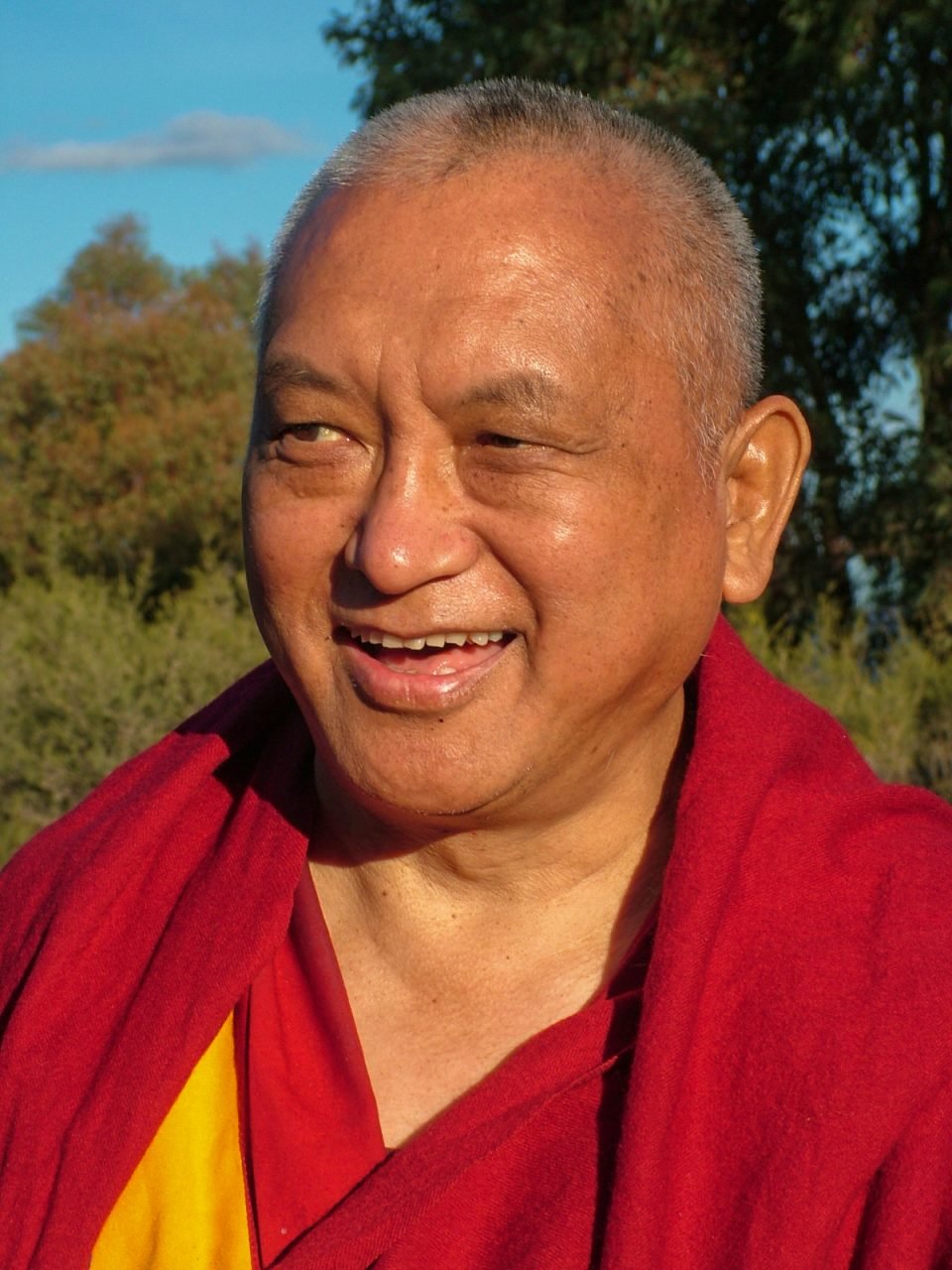
Lama Zopa Rinpoche in Australia, June 2006. Photo by Ven. Roger Kunsang.
Lama Zopa Rinpoche’s care for animals is legendary, and he used every opportunity to bless and benefit sentient beings of all shapes and sizes, wherever he traveled. In this 9 minute video of Rinpoche offering an animal blessing in Australia in 2006, we can enjoy a short teaching from Rinpoche about the benefits of offering Dharma imprints to animals, with so many fortunate (and adorable!) furry and feathered creatures present. We can also take comfort in Rinpoche’s infectious laughter and the joy of such a gathering, made even more so by the uplifting song, “How Great it Would Be” by George Galt playing in the background.
You can read a recent collection of the extensive advice that Lama Zopa Rinpoche has offered about benefiting animals:
fpmt.org/edu-news/wish-fulfillment-for-all-animals
Please also visit our webpage, Benefiting Animals: Practices and Advice, which contains many resources for those wishing to benefit animals in the most extensive ways possible:
https://fpmt.org/education/prayers-and-practice-materials/benefiting-animals-practices-and-advice
Foundation for the Preservation of Mahayana Tradition (FPMT), is a Tibetan Buddhist organization dedicated to the transmission of the Mahayana Buddhist tradition and values worldwide through teaching, meditation and community service.
22
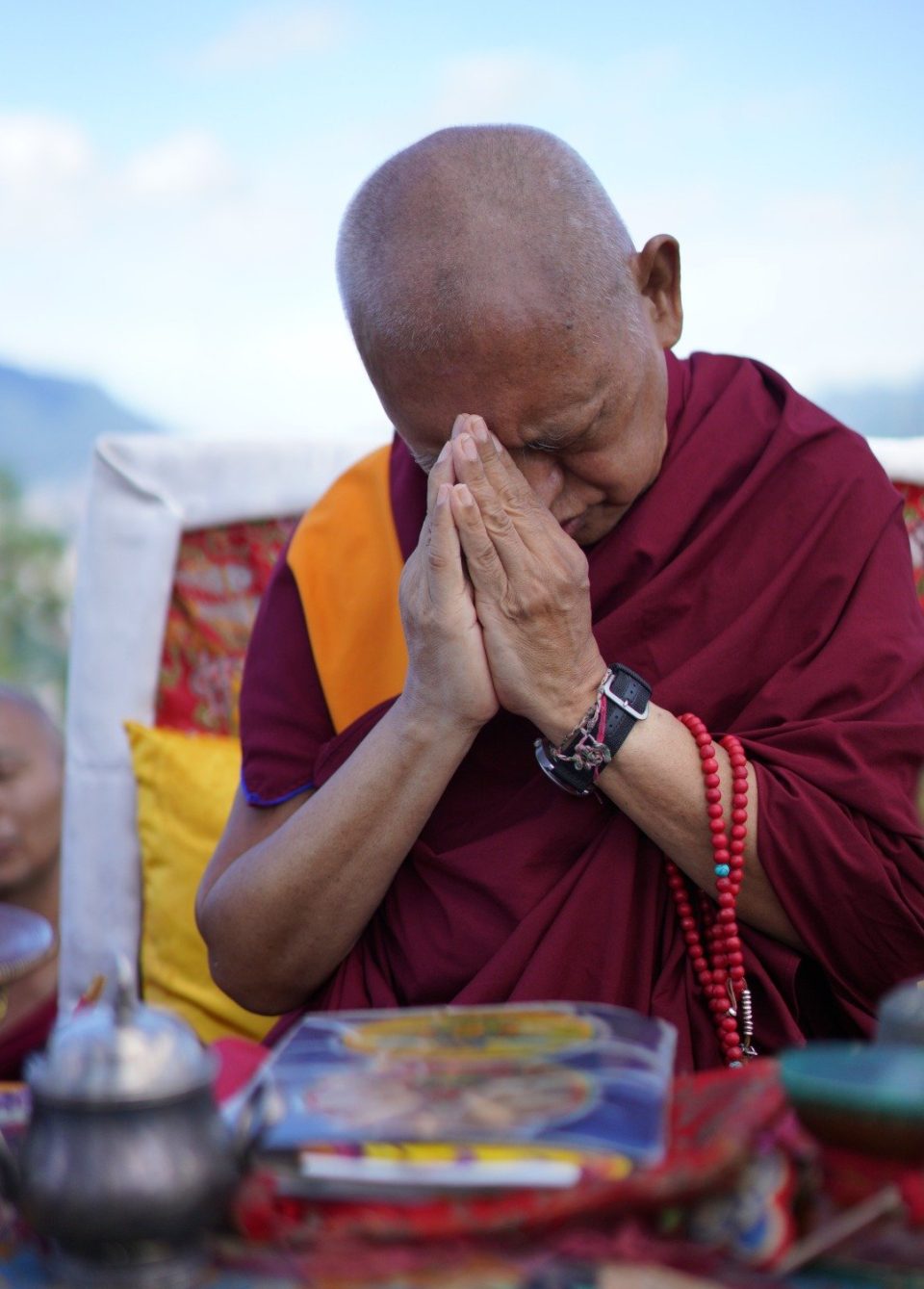
Lama Zopa Rinpoche, Kopan Monastery, 2020. Photo by Ven. Lobsang Sherab.
In this short yet powerful advice, Why the Guru Shows the Aspect of Making Mistakes, Lama Zopa Rinpoche discussed some of the key points of the practice of guru devotion, focusing on the concept of tshul, “showing the aspect”: because buddhas need to manifest in ordinary forms to teach us their behavior can appear unenlightened or mistaken. In other words, they “show the aspect” of making mistakes for our sake.
About this advice, Rinpoche said: “This is my gift, a more important, more precious gift than the whole sky filled with gold, diamonds, and wish-fulfilling jewels.”
Lama Zopa Rinpoche elucidates the topic of guru devotion extensively in The Heart of the Path: Seeing the Guru as Buddha which was drawn from nearly fifty teachings given over three decades and includes commentary on the traditional guru devotion teachings found in the lam-rim, practical advice on guru devotion, and inspiring stories of past guru-disciple relationships, as well as extensive commentary on the practice of guru yoga.
“Without guru devotion, nothing happens-no realizations, no liberation, no enlightenment-just as without the root of a tree there can be no trunk, branches, leaves or fruit. Everything, up to enlightenment, depends on guru devotion.”
https://shop.fpmt.org/Heart-of-the-Path-eBook-PDF_p_2360.html
https://www.lamayeshe.com/article/chapter/heart-path
- Tagged: guru devotion
8
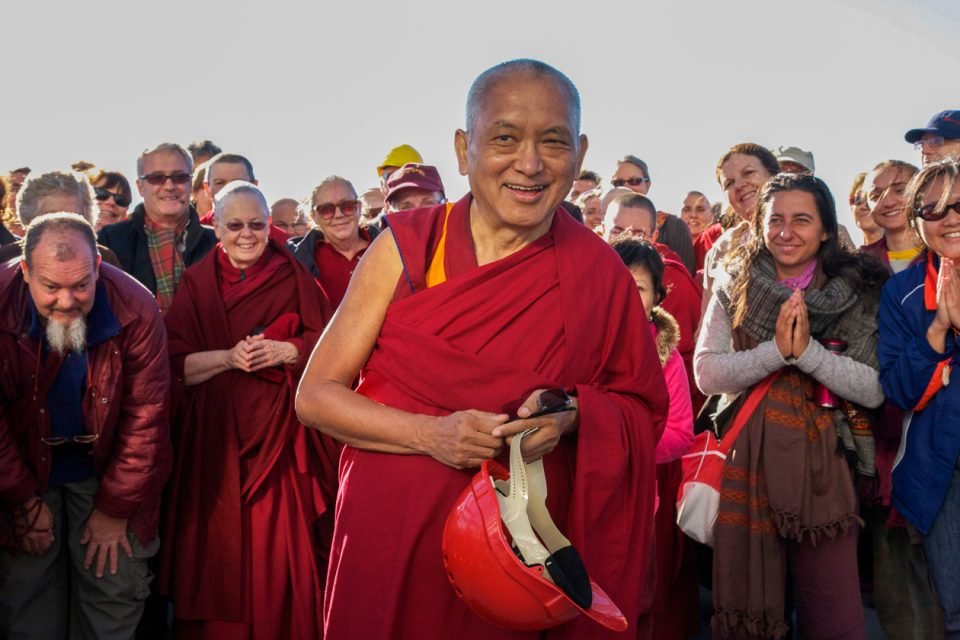
Lama Zopa Rinpoche at the Great Stupa of Universal Compassion, Bendigo, Australia, April 2011. Photo by Ven. Roger Kunsang.
Lama Zopa Rinpoche discussed reincarnation in this archival video clip. During a quiet moment at the April 2011 retreat at the Great Stupa of Universal Compassion near Bendigo, Australia, Rinpoche gave an informal talk that was recorded by Ven. Thubten Kunsang, who traveled with Rinpoche, recording Rinpoche’s teachings and taking photos. The video was recorded before Rinpoche manifested a stroke at the retreat. Here’s a summary of the video:
Rinpoche began this teaching by explaining that when someone dies, their body disintegrates and becomes dust, but their mind doesn’t stop. Their mind continues.
Rinpoche then offered the example of a family with children from the same mother. Some of the children in the family may be very intelligent or very compassionate, but sometimes there might also be a child who is very foolish and ignorant. One child may cry if they see someone else being beaten or even an insect being killed. That child can’t stand seeing others hurt and cries because of their compassion. And then, from the same mother, there may be one child who doesn’t care about this and maybe themselves want to kill.
Rinpoche explained that this shows that the minds of the different children didn’t come from the mother’s mind. The mind has its own continuity and is settled upon the body. The body of a child comes from their parents. But their mind doesn’t come from the parents. The mind has its own conditions from before.
So if in a past life one was more compassionate, the mind was trained in that, and the result is that in this life, they are compassionate, Rinpoche explains. Similarly if one was more angry in a past life, then the mind was trained or habituated to anger, which describes the result in this life. So there’s a cause from before a child takes birth in the mother’s womb that has a consequence in the present life. In past lives there were certain negative actions done, which polluted the mind. And so then there’s the result of that.
Rinpoche then talked about a book that he has in which a professor collected examples of children and older people who could remember their past lives. These are people in the West, but their stories are hidden and not part of the culture. They were discouraged from sharing their stories. Then there are people who can see other people’s past and future lives.
However, Rinpoche explained, there’s nobody who discovered or who realized that there’s no past and future lives and that there’s no reincarnation and karma. There’s nobody who has discovered or realized there is only one life. Many people have just assumed this or were taught this, but there’s nobody who realized this. Rinpoche concluded by explaining that those who have realized past and future lives are numberless.
You can watch the video “Lama Zopa Rinpoche on the Topic of Reincarnation, April 2011”:
Foundation for the Preservation of Mahayana Tradition (FPMT), is a Tibetan Buddhist organization dedicated to the transmission of the Mahayana Buddhist tradition and values worldwide through teaching, meditation and community service.
- Tagged: lama zopa rinpoche, reincarnation
4
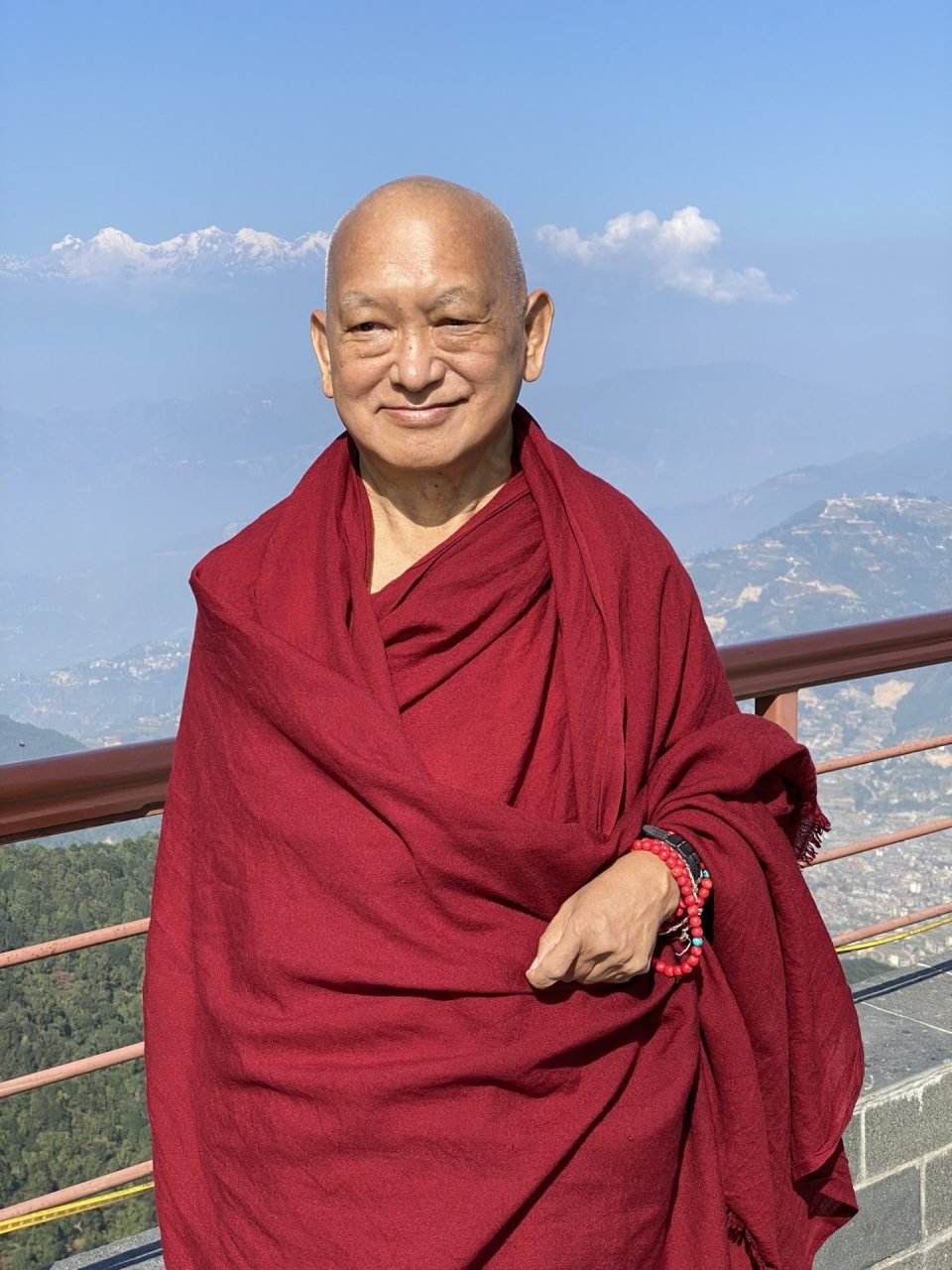
Lama Zopa Rinpoche in Kathmandu, Nepal, November 2021. Photo by Ven. Roger Kunsang.
No matter where we live in the world, facing severe conditions resulting from the weather or natural disaster effects us all. Every year, hundreds of disasters of the elements occur around the world due to drought, floods, extreme weather, extreme temperature, landslides, dry mass movements, wildfires, volcanic activity, and earthquakes.
For example, recently Centro Muni Gyana, the FPMT center in Palermo, Italy, was surrounded by flames due to wildfires in Sicily at the end of July. Incredibly, the fire was burning around the center but stopped right before the stupas that had been built on the center’s property according to Lama Zopa Rinpoche’s recommendation.
As another example of the universality of natural disasters, severe flooding in Vermont, US, devasted several towns close to Milarepa Center but fortunately the center suffered only minor damage including fallen trees.
Lama Zopa Rinpoche discussed this in a letter to a student who lived in an area prone to hurricanes:
“Whatever problems there are can be made less, and even completely stopped, if someone takes strong refuge and prays to even just one buddha. The weather can change in that very hour by the power of one person making prayers. There is no question that if the person who makes the prayers has realizations, such as the realization of bodhicitta, which is actually the best realization, then every single prayer has incredible power. There are stories of many bodhisattvas and great saints in the past who were able to prevent floods, change the direction of rivers, stop them altogether, and walk across them to the other side.”
And further, Rinpoche explained in advice for dealing with intensely hot conditions:
“The foundation of Buddhism is that happiness and suffering come from the mind, from your mind. So your mind is the creator. It’s explained in Abidharmakosha, this is one important subject to study. The various worlds came from the mind, born from the mind. It’s either so hot, or there are landslides or earthquakes. These outside conditions are caused by non-human beings. But that’s not the main cause. The main cause is karma. Karma is the mind; it is not the body.”
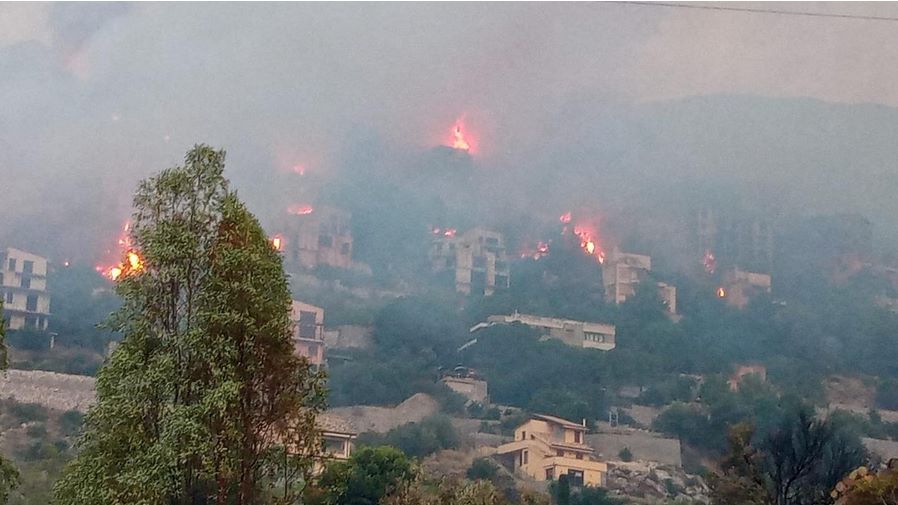
Centro Muni Gyana, the FPMT center in Palermo, Italy, was surrounded by flames due to wildfires in Sicily at the end of July. Thankfully, while a terrifying image, the center did not suffer considerable damage in this disaster.
The following practices have been advised by Lama Zopa Rinpoche for mitigating severe weather conditions:
1. Protector prayers, especially “Tea Offering to the Eight Classes” (Degye Serkyem) (page 28)
2. The Prayer to Guru Rinpoche that Spontaneously Fulfills All Wishes (Sampa Lhundrupma)
Additionally advice for various types of natural disasters from Lama Zopa Rinpoche can be found on the advice page on FPMT.org
and on the Lama Yeshe Wisdom Archive
Foundation for the Preservation of Mahayana Tradition (FPMT), is a Tibetan Buddhist organization dedicated to the transmission of the Mahayana Buddhist tradition and values worldwide through teaching, meditation and community service.
31
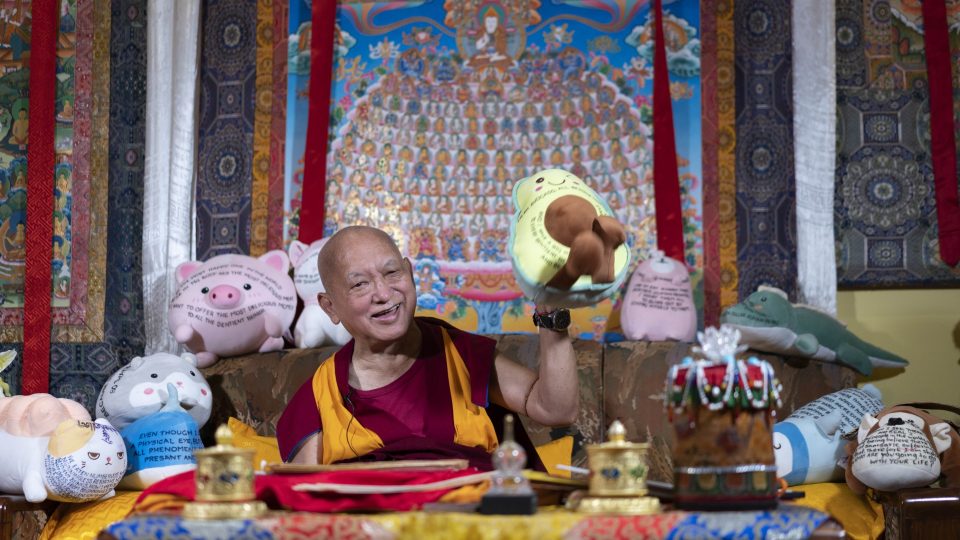
Lama Zopa Rinpoche with many of his stuffed Dharma animal friends, Kopan Monastery, Nepal, November 2020. Photo by Ven. Lobsang Sherab.
Rinpoche began this teaching, given on November 6, 2020, reminding us that the I does not exist from its own side, because it is a dependent arising. The I has been appearing to our minds as if it exists from its own side since beginningless rebirths, and we have held on to that mistaken view. But it does not exist at all like this, it’s a total hallucination.
In fact, Rinpoche added, all phenomena of samsara and nirvana do not exist from their own side because they are dependent arisings.
Rinpoche discussed the meaning of ten drel and ten jung. Ten means “depends on” or “depends to” so this eliminates eternalism. Jung is “arising,” drel is “connected.” “By depending on others, it arises.” So, “there is no existence at all from its own side.” Because it arises, this eliminates nihilism.
Rinpoche stressed that we have to practice mindfulness all day and night to see that what appears to be real has actually never existed from its own side. When we are not aware of this mistaken view, then the I and all other phenomena appear to us as real. When you believe that those appearances are true, then the self-cherishing thought—the ignorance holding the I as real—and all the delusions arise. Then we create karma and suffer in samsara. We have done that already from beginningless rebirths up to now. And so far, we haven’t become free from samsara. So we need to have the awareness that without depending on the base to be labeled, objects do not exist from their own side, not even an atom exists from its own side.
Following Phabongkha Rinpoche’s commentary, Rinpoche explained that an imputed phenomenon needs to have three attributes:
- It is renowned to a conventional mind;
- It is not harmed by another conventional valid mind; and
- It also is not harmed by the reasoning analyzing the ultimate.
Rinpoche then explained the three attributes, beginning at 44:42 in the video.
We invite you to go deeper into the topics presented here, plus many others, by watching Rinpoche’s video and reading the full transcript of Rinpoche’s teaching.
Watch Lama Zopa Rinpoche’s teaching “The Whole World Exists in Nothing More Than Mere Name”:
Watch more videos from Lama Zopa Rinpoche’s thought transformation teaching series and find Rinpoche’s teachings translated into Spanish, Italian, French, Chinese, and Russian
Foundation for the Preservation of Mahayana Tradition (FPMT), is a Tibetan Buddhist organization dedicated to the transmission of the Mahayana Buddhist tradition and values worldwide through teaching, meditation and community service.
24
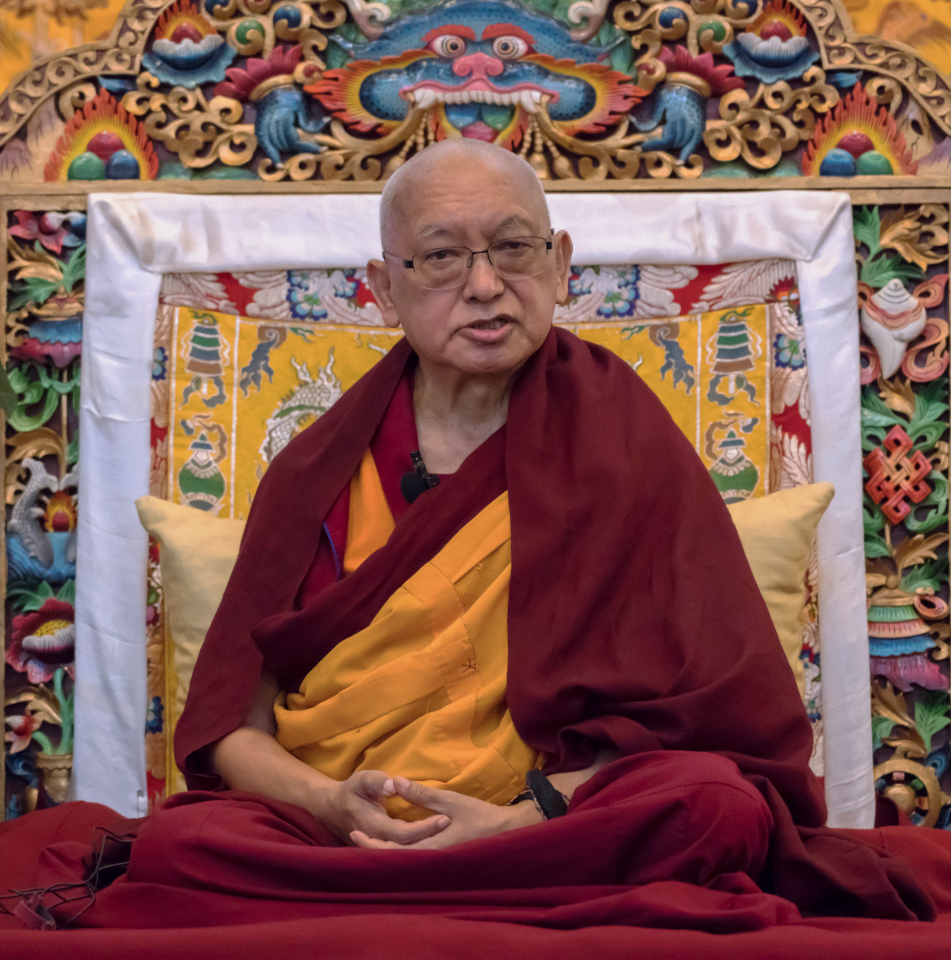
Lama Zopa Rinpoche teaching during the November Course, Kopan Monastery, December 2018. Photo by Ven. Lobsang Sherab.
During the 2018 November Course at Kopan Monastery, Lama Zopa Rinpoche outlined how to reach enlightenment based on the lamrim and the importance of studying it. Rinpoche emphasized that merely knowing the lamrim is not enough; it needs to be applied in daily life. Here’s an excerpt from Rinpoche’s teachings.
Practice mindfulness and the three principal aspects of the path to enlightenment—renunciation, bodhicitta, and right view. Then everything done with renunciation becomes the cause of liberation and does not become the cause of samsara. Then everything done with bodhichitta becomes the cause of enlightenment. Then with right view, everything becomes a remedy to samsara, a remedy to ignorance, which is the root of all your suffering, your samsara, the root of all your sufferings of samsara. It eliminates that; that’s what you need.
If you don’t like suffering, you have to put in effort to actualize emptiness, if you don’t like suffering. If you don’t like depression, if you don’t like any suffering, even diarrhea, whatever you don’t like, then you need to meditate on emptiness, and in particular you have to put effort into realizing emptiness. Study emptiness, all the extensive philosophy teachings, then lamrim, the essence, the short teachings, very important teachings.
You need to not only study—you leave it up to the intellect, you leave it up to the tape recorder, you invest so much information, you put in a tape recorder or computer—not like that. You invest in your brain so much information, but no practice, you only discuss, only to be an important professor—not like that. You need to actualize. So everything becomes practice, and through practice, you actualize. Everything becomes the antidote to your samsara, to your ignorance, which is the root of your samsara. So it eliminates the root of oceans of suffering of samsara. That’s what you need. If you don’t like suffering, you need to put effort in that. It’s extremely worthwhile.
Not only that, not only to free yourself from oceans of suffering of samsara, not only that, but with the help of bodhichitta, you collect inconceivable, inconceivable, inconceivable merits, with that support. Then with the wisdom realizing emptiness, you directly cease the obscuration, not only gross but subtle obscuration. Then you achieve enlightenment for sentient beings, and you are able to liberate all sentient beings from oceans of samsaric sufferings and bring everyone to buddhahood.
If you don’t like suffering, if you have problems—a relationship problem, a problem with the family, with the husband, with the wife or children, with friends, whatever—you should know that. The antidote—to be free from the suffering of samsara—you need to be free from delusion and karma; you need to be free from ignorance, the root of samsara. So you need to meditate on emptiness. That is what you need.
Otherwise, your problems have no end. Then you rely on psychology. It has no end, relying on psychology or psychiatry. It has no end. Your going to hospital has no end; it’s endless. Your going to hospital, having an operation on your brain, it’s endless. It becomes endless. That is the nature of samsara.
When you have problems, think: “Oh, this is a sign that I’m in samsara. This shows me. This proves it to me. It is sign that I’m in samsara. So, oh, I need to be free from samsara, so then I should practice Dharma.” It should have that as a conclusion.
The conclusion you should come to is that. To actualize Dharma, the heart of Buddhadharma—renunciation, bodhichitta, right view—you should come to the conclusion to practice lamrim. You should come to that conclusion, then that is the best.
You have something to do that is most worthwhile for you and every sentient being—every hell being, they are numberless, for everyone, to benefit every ant, every fish, every chicken, every goat, sheep, what we eat, to benefit every mosquito, every small ant, small flies, so tiny, but numberless, to everyone, to benefit, especially with bodhichitta, then, every human being, every sura being, every asura being, every intermediate state being. Then instead of depression, you have so much happiness in life, because you know what to do, you know what you should do. You know the meaning of life!
Watch the 24-minute video of Rinpoche teaching at Kopan Monastery from which this excerpt is taken:
Colophon: Excerpted from Lama Zopa Rinpoche teaching at Kopan Monastery, Nepal, December 12, 2018. Simultaneously transcribed by Ven. Joan Nicell. Lightly edited by Laura Miller, July 2019. (Complete unedited transcript here.)
Lamrim Year is an essential guide for meditators who want to develop their mind in the graduated path to enlightenment (lamrim). This unique study program provides a 365-day outline of the graduated path in a clear, practical format that is suitable for both individual and group practice. The daily quotes and text have been selected from four decades of teachings by Lama Yeshe and Lama Zopa Rinpoche, and offer a taste of their teaching style and scope: lamrimyear.com
You can access all the video teachings from Lama Zopa Rinpoche during the 2018 Kopan lamrim meditation course:
fpmt.org/media/streaming/teachings-of-lama-zopa-rinpoche/kopan-november-course-2018
- Tagged: essential extract, kopan course, lamrim year
21
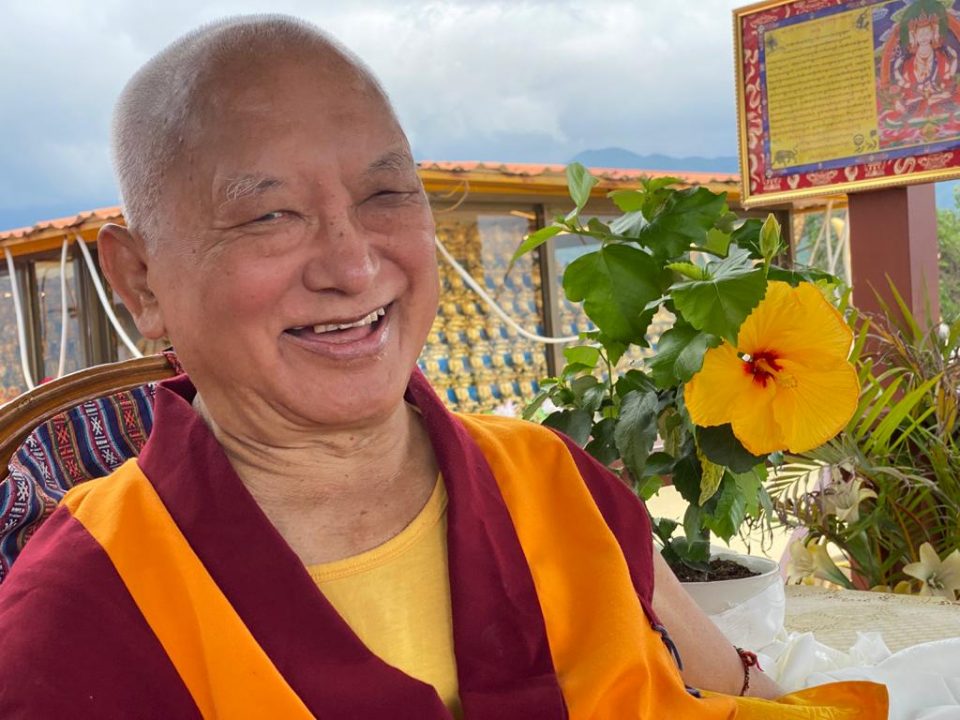
Lama Zopa Rinpoche, Kopan Monastery, Nepal, July 2020. Photo by Ven. Roger Kunsang.
In 2020 on Chokhor Duchen (celebrated this year on July 21, 2023), Lama Zopa Rinpoche offered a video teaching from Kopan Monastery as part of his thought transformation series entitled, “Wake Up– Don’t Waste the Four Holy Days of Guru Shakyamuni Buddha.”
Chokhor Duchen commemorates the anniversary of Shakyamuni Buddha’s first teaching after showing the aspect of attaining enlightenment, and is one of the holy days of Guru Shakyamuni Buddha, when the power of any meritorious action is multiplied 100 million times.
Rinpoche begins this teaching discussing the twelve deeds done by Shakyamuni Buddha, which reveal why we need to practice Dharma.
Shakyamuni Buddha gave three turnings of the wheel of Dharma: the four noble truth teachings in Sarnath; the Prajnaparamita teachings in Rajgir; and the Chittamatra view. On wheel-turning days, because merit is multiplied by 100 million, Rinpoche is asking us to “wake up” and not waste the opportunity by being distracted by worldly pleasures and worldly concerns. For example, writing sutras in gold ink is a way to collect skies of merit.
Rinpoche shares more about the benefits of the Sutra of Great Liberation, including that if you read it just before you die you are immediately rescued from the lower realms.
Watch Lama Zopa Rinpoche’s teaching “Wake Up—Don’t Waste the Four Holy Days of Guru Shakyamuni Buddha“:
A full transcript of this teaching is also available.
You can learn more about the “unimaginable benefits of the Sutra of Great Liberation which is now available in English:
https://fpmt.org/edu-news/unimaginable-benefits-the-sutra-of-great-liberation-is-now-available-in-english/
You can follow Lama Zopa Rinpoche’s advice on beneficial practices to do on Chokhor Duchen:
https://fpmt.org/edu-news/celebrate-chokhor-duchen-and-international-sangha-day-on-july-21-2023/
Read about the vast array of pujas and practices being offered by over ten thousand ordained sangha on this special day:
https://fpmt.org/charitable-activities/projects/retreats-and-practices/pf-news/offering-to-ten-thousand-sangha-and-pujas-sponsored-on-chokhor-duchen/
Watch more from the video series Lama Zopa Rinpoche’s Teachings on Thought Transformation and find links to videos in transcripts, MP3s, additional practice advice, and more:
https://fpmt.org/fpmt/announcements/resources-for-coronavirus-pandemic/advice-from-lama-zopa-rinpoche-for-coronavirus/
- Tagged: chokhor duchen, sutra of great liberation
6
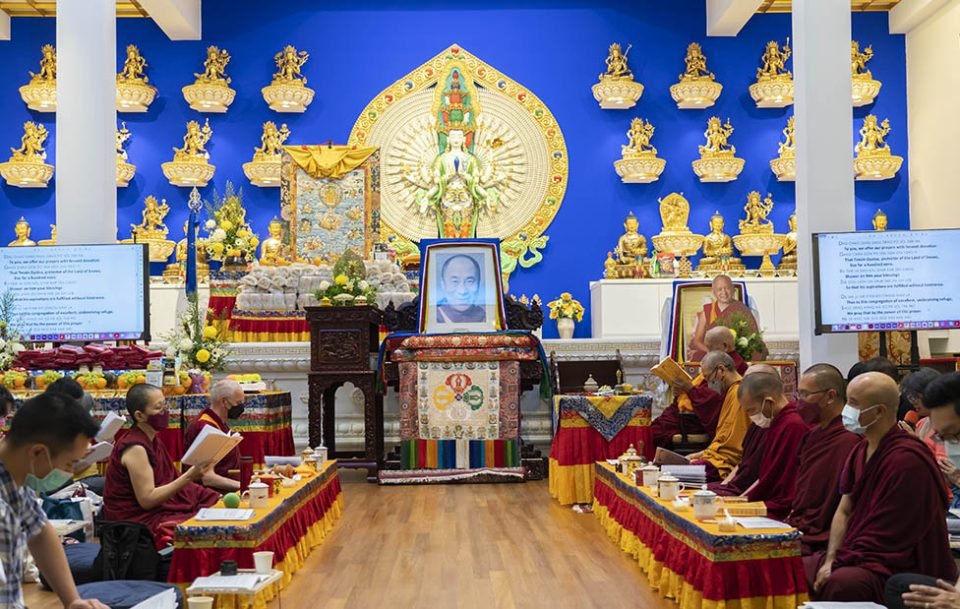
Lama Zopa Rinpoche leading a Guru Puja in celebration of His Holiness the Dalai Lama’s birthday, July 6, 2022, in Singapore. Photo by Ven. Lobsang Sherab.
Today, July 6, the world celebrates His Holiness the Dalai Lama’s 88th birthday. You can watch the message His Holiness shared earlier today, on the occasion of his birthday.
A few hours after his discharge from a hospital in Singapore last year for a medical procedure, Lama Zopa Rinpoche joined the Amitabha Buddhist Centre (ABC) community in Singapore for their special celebration of His Holiness the Dalai Lama’s 87th birthday on July 6, 2022. Rinpoche offered incredibly powerful and precious words about His Holiness’s qualities, guru devotion, and impermanence.
We invite you to watch and hear the full message Rinpoche offered on His Holiness’s birthday last year. You may also read a full transcript of Rinpoche’s words.
“Definitely in your heart, rely on His Holiness and often do requests,” Rinpoche advised us. “Request the success of realizations and to grant blessings in your heart and to bless your heart to transform it into the path to enlightenment. As His Holiness often emphasizes, bodhicitta and emptiness. Often when he talks, every time, that is kind of the basis, the foundation. So you practice like that from your heart. From your side, you rely on him, you request and rely on His Holiness, then definitely from His Holiness’s side, definitely he will all the time guide you from life to life, up to enlightenment.”
“You might think His Holiness is not there,” Rinpoche explained, “But in reality, His Holiness is there. You have to know that. His Holiness sees you all the time. His Holiness sees you day and night. Whatever you are doing, His Holiness sees you all the time. Because the past numberless buddhas, present numberless buddhas, and future numberless buddhas see you all the time, without break even for a second, never distracted away from that, even for a second.”
We have many practices related to His Holiness the Dalai Lama for students to use on this special day: fpmt.org/charitable-activities/projects/supporting-our-lamas/celebrating-his-holiness-the-dalai-lamas-88th-birthday-on-july-6/
Through comprehensive study programs and practice materials, FPMT Education Services nourishes the development of compassion, wisdom, kindness, and true happiness in individuals of all ages.
- Tagged: his holiness
28

Lama Zopa Rinpoche in Australia, June 2006. Photo by Ven. Roger Kunsang.
FPMT International Office has begun to process archived teachings of Lama Zopa Rinpoche that were not previously available on our Rinpoche Available Now page or on our YouTube channel.
We started this project with teachings from June 2—3, 2006 at Tara Institute, Australia. Those teachings, previously available on DVD only, were entitled, “The Need For Wisdom And Compassion” and “Why We Need a Spiritual Path.” These teachings were part of a longer tour through Australia including a month long retreat in Adelaide.
In September we shared four of the seven videos from this teaching, and today we are pleased to share the remaining three.
We will continue to publish these legacy teachings and will share information as new teachings from the archive become available.
As a reminder, the Rinpoche Available Now page contains video teachings from over sixty teaching events with Lama Zopa Rinpoche going back to 2009, including the most recent teachings given at the fifty-third November Course at Kopan Monastery (26 November 26—December 26, 2022); and the Thought Transformation Teachings Rinpoche gave at Kopan Monastery, Nepal and Amitabha Buddhist Centre, Singapore, between 2020-2022. Also, please visit the Lama Yeshe Wisdom Archive for many more videos of Lama Yeshe and Lama Zopa Rinpoche dating back to the 1970s!
Please enjoy the fourth video in this teaching series, from June 3, 2006:
Foundation for the Preservation of Mahayana Tradition (FPMT), is a Tibetan Buddhist organization dedicated to the transmission of the Mahayana Buddhist tradition and values worldwide through teaching, meditation and community service.
- Tagged: lama zopa rinpoche, rinpoche available now
22
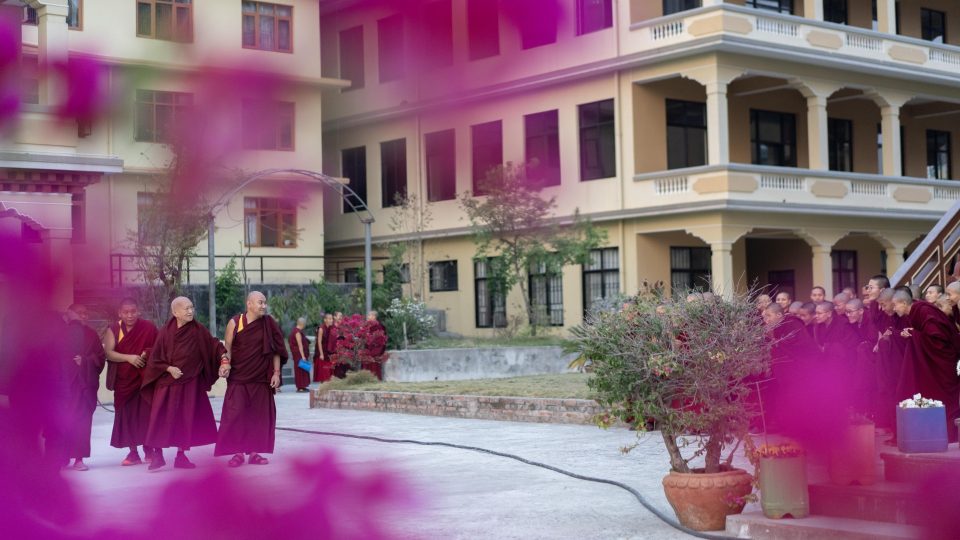
Lama Zopa Rinpoche leaving Khachoe Ghakyil Nunnery, March 2023. Photo by Ven. Lobsang Sherab.
We are very pleased to share two compositions by Lama Zopa Rinpoche that have been recently made available.
Extensively referencing the words of the past masters to illustrate his point, Lama Zopa Rinpoche stresses in How This Human Life Becomes the Method for Achieving Complete Buddhahood through Buddhist Study and Service that “the fastest way of achieving the state of buddhahood” is by offering your gurus service and practice with the faith that every single one of your gurus is the Buddha. Rinpoche adds that, by the wish to benefit others and serving the guru, one’s actions “become the holy Dharma.” And from that comes the joyful thought, “In this entire world there is no one who has greater fortune or merit than me.”
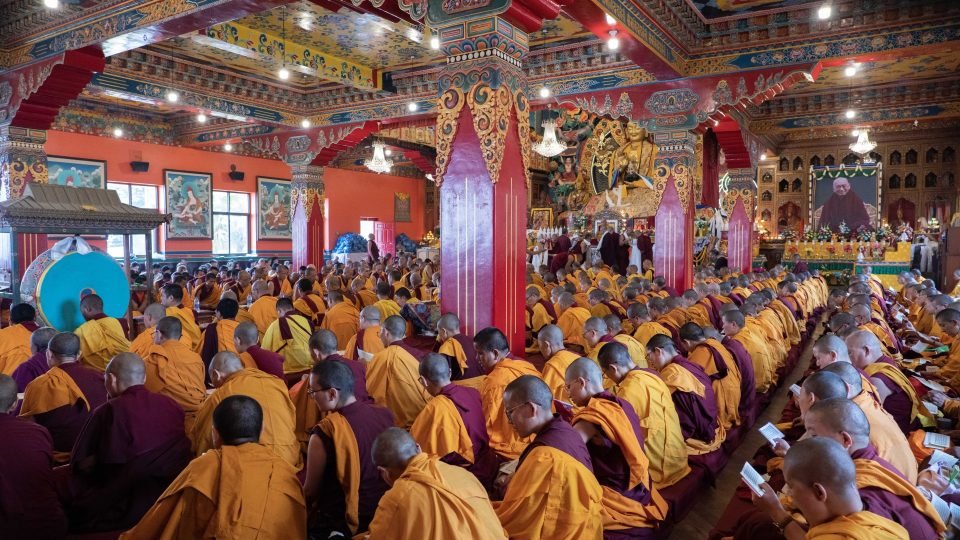
Heruka Lama Chopa puja seven days after Lama Zopa Rinpoche showed aspect passing at Kopan Monastery, April 20, 2023. Photo by Ven. Lobsang Sherab.
An Abbreviated Chakrasamvara Tsog is a beautiful condensed tsog practice composed by Lama Zopa Rinpoche, with offerings and request made to all the deities of the Heruka Chakrasamvara mandala. Extensive tsog offering was made during the Heruka Lama Chopa at the seventh day pujas for Lama Zopa Rinpoche’s swift return. This prayer, An Abbreviated Chakrasamvara Tsog, was recited many times to offer the tsog to the deities of the mandala, along with other tsog offering prayers. This practice is suitable for those who have received the Heruka initiation.
Through comprehensive study programs and practice materials, FPMT Education Services nourishes the development of compassion, wisdom, kindness, and true happiness in individuals of all ages.
- Tagged: lama zopa rinpoche
5
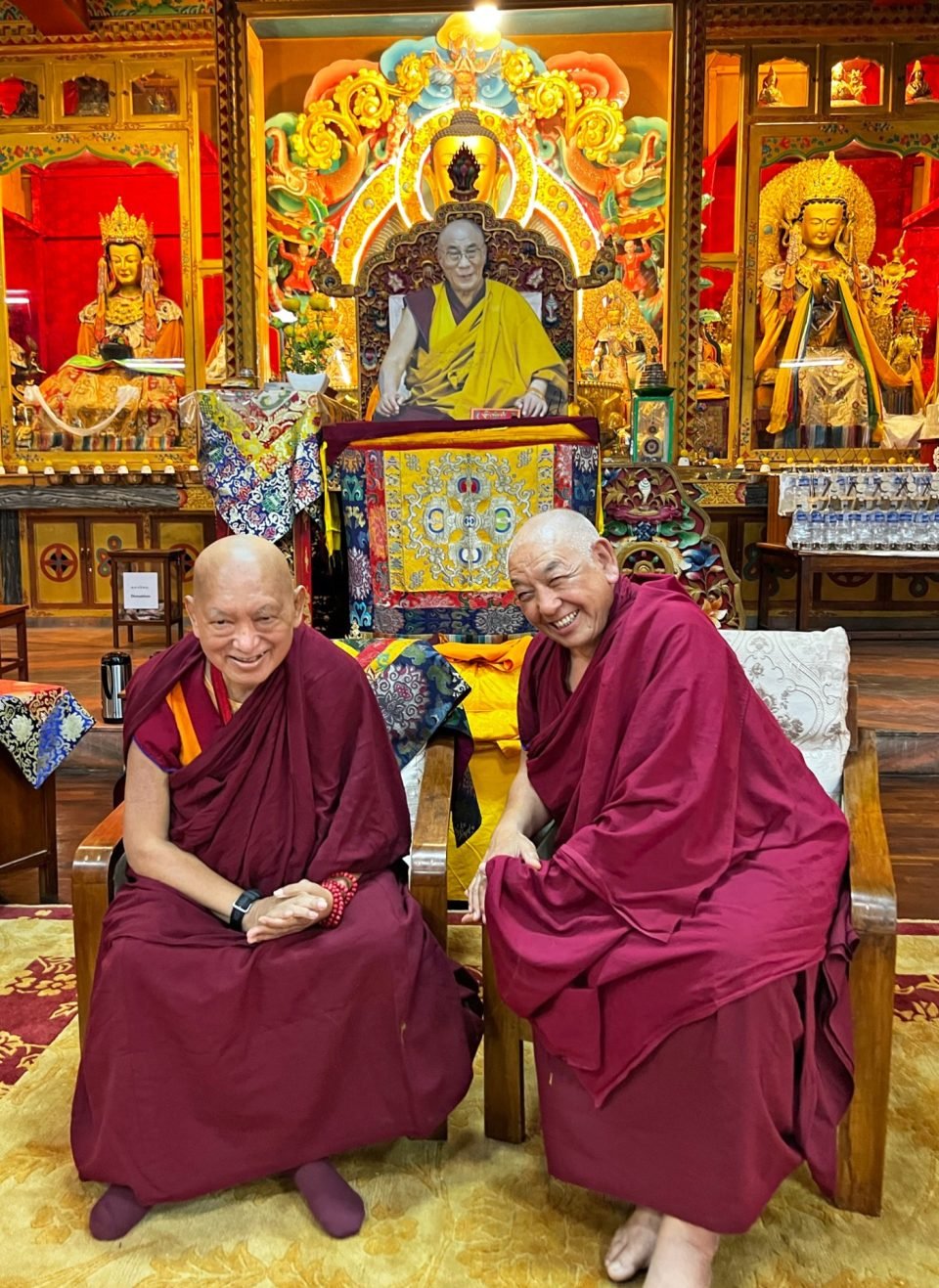
Lama Zopa Rinpoche and Geshe Thubten Rinchen, Boudhanath, Nepal, April 13, 2022. Photo by Ven. Roger Kunsang.
May 31 marked the forty-ninth day since Lama Zopa Rinpoche showed the aspect of passing away. A very moving and powerful puja occurred at Kopan Monastery with all the Kopan monks and nuns, hundreds of non-Tibetan students, and many Sherpa and Nepalese individuals.
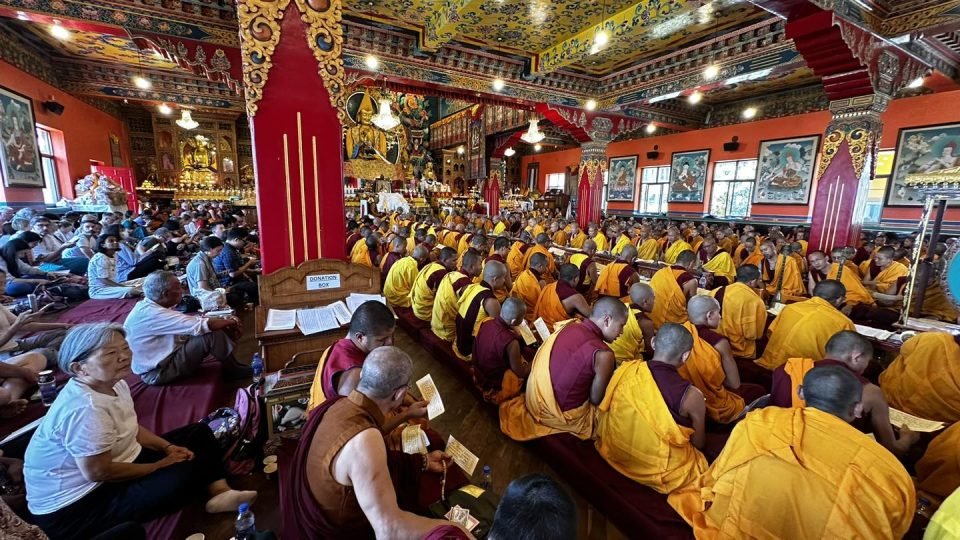
Heruka Lama Chopa with Tsog offered on the 49th day of Lama Zopa Rinpoche showing the aspect of passing away, May 31, 2023, Kopan Monastery, Nepal. Photo courtesy of Kopan Monastery
During these 49 days following Lama Zopa Rinpoche showing the aspect of passing away, an extraordinary amount of prayers, condolences, and support as well as visits to Kopan, have come from all the traditions of Tibetan Buddhism and from monasteries, organizations, high lamas, Nepalese government officials, and individuals offering prayers for Rinpoche’s swift return and sharing many moving tributes to Rinpoche’s extraordinary qualities and many beneficial activities. All the great monasteries in India offered prayers, especially at Sera Je Monastery. All the monks of Sera Je gathered every day during the first week and then every seven days following; and the abbot of Sere Je, Khen Rinpoche Geshe Tashi Tsethar, also flew up to Kopan to offer prayers directly on the occasion of the thirty-five days since Rinpoche showed the aspect of passing away. Students from around the world came to Kopan to join in many auspicious activities at this time including the prayers for Rinpoche’s swift return occurring 24 hours a day in front of Rinpoche’s holy body, the long life puja for His Holiness the Dalai Lama in Dharamsala and subsequent audience with His Holiness, and the special Heruka Lama Chopa with Tsog puja occurring every 7 days up to the 49th day of Rinpoche’s passing.
Just hours after Lama Zopa Rinpoche entered his final meditation on April 13, 2023, Sera Mey Geshe Thubten Rinchen Rinpoche spoke to the Kopan sangha and students of Lama Zopa Rinpoche, offering heartfelt words of sadness, praise, and encouragement for the future.
Geshe Thubten Rinchen Rinpoche was a close friend of Lama Zopa Rinpoche from an early age, and mentioned this to some of the Kopan sangha that same day, “From 1961, Lama Zopa Rinpoche and I stayed together in this place called Buxa for about seven years. There were many monks there, but among them Rinpoche and I lived together very intimately as part of a small group of monks. We stayed there close together, so I really know him and understand him.”
Below is the advice offered by Geshe Thubten Rinchen Rinpoche, to the monks and nuns of Kopan and to students of Lama Zopa Rinpoche, on April 13, 2023 at Kopan Monastery:
Hello, I thought to send one or two words to you all. This is the one called Thupten Rinchen of Sera Mey Monastery, Tsangpa Khangtsen. You are all probably familiar with me. The thing I want to speak about is the very sad and tragic news that I heard today at about one o’clock in the afternoon, that the one with a great altruistic mind, Kyabje Zopa Rinpoche, has passed into parinirvana. I heard this very sad, disheartening news today.
At that time, in my mind I became like a person who’s gone blank. Then, as I gradually reflected on his enlightened deeds and activities over all these years, my grief became greater and greater. There’s nothing to be done, really. But thinking foremost of Rinpoche’s main secretary, Venerable Roger, and all the other staff and monks and nuns at Kopan Monastery, I thought to offer a few words of condolence. I’m nobody to say anything, but, from this afternoon when I first heard until now tonight, about 10:00 pm, I’ve been reflecting on what’s happened. Finally, an intention to say something came. Uncontrollably, my mind has been as if going in circles. I can’t help but say something. Please don’t be upset with me.
There is the future in general, but then too I wouldn’t really know what to say. In any case, thinking of the enlightened deeds and activities of Kyabje Lama Zopa Rinpoche’s holy body, speech, and mind, just the deeds and activities of this holy life are truly something beyond comprehension. In general, the way he has benefited the Buddha’s teachings by spreading them to many foreign countries where they did not exist before, and continues to do so, and especially with regard to the teachings of the Riwo Ganden lineage, is truly something amazing. Rinpoche has spread these teachings widely to many places where they had not spread before. We all know about this.
In my observation, although there are many veritable holy lamas, among them the activities to serve and spread the Buddha’s teachings that are the most extensive and most widespread are just those of Kyabje Lama Zopa Rinpoche himself. This is what I think. Therefore, he has been inconceivably kind to us. In addition, as we can directly see, Rinpoche has been incredibly kind in supporting the Great Seats and countless particular groups within those. You may not believe it, but when I heard the news this afternoon, thinking of what an inconceivably kind and great holy being has passed away, I became immeasurably sad and inexpressibly grief-stricken. I thought to send a message then, but have been thinking about it until now. Now I can’t help but say a few words. Apart from offering this message, I have no other aims.
Venerable Roger and all of you have, from a very young age, lived at Kopan, Jangchub Choling Monastery, following the discipline and serving the monastery until becoming advanced in age. There are many senior monastics in your community. In any case, to all of you, headed by these elders, I have a few words of hope and thoughts to share. There’s no need for me to say that for a long time all of you have sincerely served Rinpoche. But at this time, Kyabje Lama Zopa Rinpoche’s unfinished deeds need to be continued. Some of the projects I know about are construction of a Guru Rinpoche statue and the project in Kushinagar, and there are other similar projects yet to be completed, right? Although Kyabje Lama Zopa Rinpoche is no longer with us now, still, I request you to please bring these types of projects, these unfinished holy deeds of Lama Zopa Rinpoche, to completion. An incarnation will definitely come.
It’s certain that you all are very downhearted at this time, however, there’s no benefit in just remaining downhearted. Whatever the case may be, what I want to say is that it is extremely important to make every effort to continue with the unfinished works of Lama Zopa. So, I request and pray that you will do this. Certainly, you are sad at heart, and I’m together with you in feeling great sorrow. I want to let you know this. This is primarily to all the staff.
Regarding Kyabje Lama Zopa Rinpoche, there are the deeds of his holy body, speech and mind. As for the holy deeds of his body, from this morning they have become like a dream. We will not have the fortune to meet him in person again. Similarly, as to the holy deeds of his speech, we can no longer hear his speech. However, in regard to the deeds of his holy mind, the deeds of his holy mind are the most important. With regard to the geshes and students at Dharma centers in many different countries, remembering the kindness of Kyabje Lama Zopa Rinpoche, they will surely consider what to do. From my side, I sincerely request that, remembering Lama Zopa Rinpoche’s kindness, they should, if possible, increase the Dharma, social service, and other works of Rinpoche more than before; but if they cannot manage this, at least continue to sustain the various works Rinpoche has initiated as they exist now without letting them decline. It is very presumptuous of me to say this, but please don’t feel irritated.
Then, at this time, in my opinion, in Nepal, Ogmin Jangchub Choling and also the nunnery, Kachoe Ghakyil Ling, these two monasteries are not insignificant. Rather, they currently engage in studies of both sūtra and tantra. Therefore, you need to remember again and again what are the deeds of Lama Zopa Rinpoche’s holy mind and his heart’s intentions. In general, this is an extremely sad and unfortunate situation such as I have probably never experienced. Definitely, intense grief will arise. But when it arises, some may think, “Now there’s nothing to be done. Our refuge is gone, he has passed away. [Geshe Thubten Rinchen Rinpoche is overcome and cries briefly] There’s no point in anything now.” On one hand, it’s not sure that this is entirely untrue, right? However, if one just thinks in this way, it is fundamentally not all right. If you ask why, it’s because the heart intention of Kyabje Lama Zopa Rinpoche is what?
During our very own lifetimes, on this land where these monasteries now stand, there was nothing before, barely even a house. Now, a great monastic community with a union of study and practice of both sūtra and tantra has been well established. Compared to this great deed and enlightened activity, there’s none higher. Recognizing this, you need to continue this great deed and intention of Rinpoche’s holy mind to the best of your ability. I have no more significant request than this.
You need to generate enthusiasm and make effort even more than before to not let the unified study and practice of sūtra and tantra decline, but rather increase it more and more. To sustain this work is extremely important. As I’ve already said, of course one will be downhearted, but there’s no sense in remaining like this. If one just thinks, “Now there’s nothing to be done,” then there is no offering of practice and no offering of pleasing the guru. Rather, recognizing that there’s no higher offering to Lama Zopa Rinpoche than fulfilling his sacred intentions, all the monks now in the monastery need to pull together and consider what is the best way forward to sustain this work. This is one thing I humbly request of you.
Just as I’ve requested the monks, I request the same of all the nuns of Kachoe Ghakyil Ling. All of you will surely be sad and feel as if stricken by an inconsolable grief. However, there’s no point in just dwelling in this. Rather, just as I’ve said to the monks, some may say that now there’s nothing to do and no point to stay in the monastery and then think to leave. This may occur, but this is a totally mistaken path. Not only that, instead of accomplishing Kyabje Lama Zopa Rinpoche’s intentions, it becomes not following his wishes.
Therefore, although the deeds of Rinpoche’s holy body and speech have come to an end, it is extremely important to know the wishes of Lama Zopa Rinpoche’s holy mind and strive to accomplish them. His intention is as I said before. From nothing to just a small nunnery, to now a great community of nuns has been established, and not only that, engaged in the unified study and practice of both sūtra and tantra. Not only has this been established, but as a fruit of these efforts it is the first monastery to produce geshemas, something that didn’t even exist in name in Tibetan not long ago. You all know this. For this to happen Kyabje Lama Zopa Rinpoche worked incredibly hard with great determination. Seeing this and taking it to mind then, although at this time you may be disheartened in some moments, you should not give up, thinking “Now I’ll leave the community and just go off some place to live alone.” It’s possible you may be small minded like that. If you do that, then, as I said to the monks, it is not fulfilling Rinpoche’s holy wishes and is not an offering of practice. Therefore, I request you to think well what it is to accomplish Rinpoche’s heart intentions, choose the right path, and not follow a mistaken path. It’s up to each individual person to consider this well. There’s nothing better to do than this. Consider what is the intention of Rinpoche’s enlightened mind, understand and strive to accomplish that. If you do this then it is an offering of pleasing and bringing joy to the lama. There’s no better offering. So I earnestly request you to make such offerings of pleasing the guru and fulfilling his instructions. My speaking in this way is very presumptuous, but please don’t be irritated. It is my sincere opinion. The main thing is to serve.
Lama Zopa Rinpoche has passed away now—you know that. But although he has passed away, he was an inconceivably great spiritual teacher, as you all know well. He was a great practitioner of the altruistic wish to accomplish the welfare of others and took great interest in studies as well. We have directly seen this. At this time, in order to fulfill his wishes and also to benefit ourselves, whether as an organization or in our own room, we should recite the Guru Puja, placing Lama Zopa Rinpoche at the very center of the merit field in clear light, make offerings, and from among the offerings focus on the offering of practice. There’s no need for me to tell you, actually. Until now all of you have taken Rinpoche’s advice to heart, engaged in studies and practice and made offerings of pleasing the guru very well. Nonetheless, we are all afflicted sometimes by faults of body, speech and mind, and sometimes see faults in the lama. At such times we should accumulate recitations of the Confession of Moral Downfalls in order to purify negativities and obscurations arising from the body, speech and mind being afflicted by negative karmas. I have personally seen how beneficial it is to confess and practice restraint in this way.
Rinpoche’s enlightened deeds and activities of this life have finished, but we can hang our hopes on praying that an unmistaken reincarnation of the lama swiftly appears who is able to continue the work of his previous life in just the same way, and we can request to once again enjoy the nectar of his holy speech turning the wheel of Dharma as before. In addition, we can request that in that life he remain long to benefit transmigratory beings. Remembering how kind Kyabje Lama Zopa Rinpoche has been to us, we can make such requests while recalling all of Rinpoche’s kind deeds. Please consider these suggestions.
We can clearly visualize the sacred venerable guru, Kyabje Lama Zopa Rinpoche, then think, “Just as he engaged in enlightened deeds, so too may I personally continue to sustain those deeds.” We should meditate like that. I think this is the best way to pray and the best way to serve now that Rinpoche has passed into parinirvana. I think this is the best thing to do. With the idea that this might be helpful to you all, I’ve offered these words. If you agree, then please act accordingly.
Finally, to summarize, this great monastery of Kopan monks and nuns has been established; to put it concisely, at this time of sorrow, there’s a real danger that you think, “How unfortunate! There’s nothing to be done now. It’d be better to go off to some other place.” If you follow such thoughts, it is not making an offering of fulfilling Kyabje Lama Zopa Rinpoche’s advice, it is not remembering his kindness, and it will lead to the destruction of his kind enlightened activities. Therefore, when such thoughts arise, recognize them as just the result of grief and don’t follow them. Rather, strive to accomplish Rinpoche’s intentions even more than before. Please continue to study and practice at least as well as now, and if possible improve upon the present. Not only that, but do not leave study at the mere level of listening and contemplation, but take all the meanings gleaned through these into meditative practice and generate realizations. Offer this as a personal commitment and actually practice accordingly. I implore you to do this. This is the best offering of practice, the best offering of pleasing the lama, and the best way to commemorate the life of the lama. Don’t take my word for it. All of you should reflect yourselves on what are the holy wishes of Kyabje Lama Zopa Rinpoche, and there is nothing for you not to understand. I pray that you will do this. I urgently request you to consider things in this way.
Likewise, at your monastery there is Khen Rinpoche and the scriptural teachers. I implore them to take care to give pertinent advice and that it not become just idle talk but is put into practice. My final request is this. Please don’t feel irritated that these words are too many or are inappropriate. Thank you.
Translated by Ven. Tenzin Legtsok with assistance from Sera Je Geshe Ngawang Sangye at Kopan Monastery, Nepal, on April 22, 2023. Edited by Ven. Ailsa Cameron.
- Tagged: geshe thubten rinchen
26
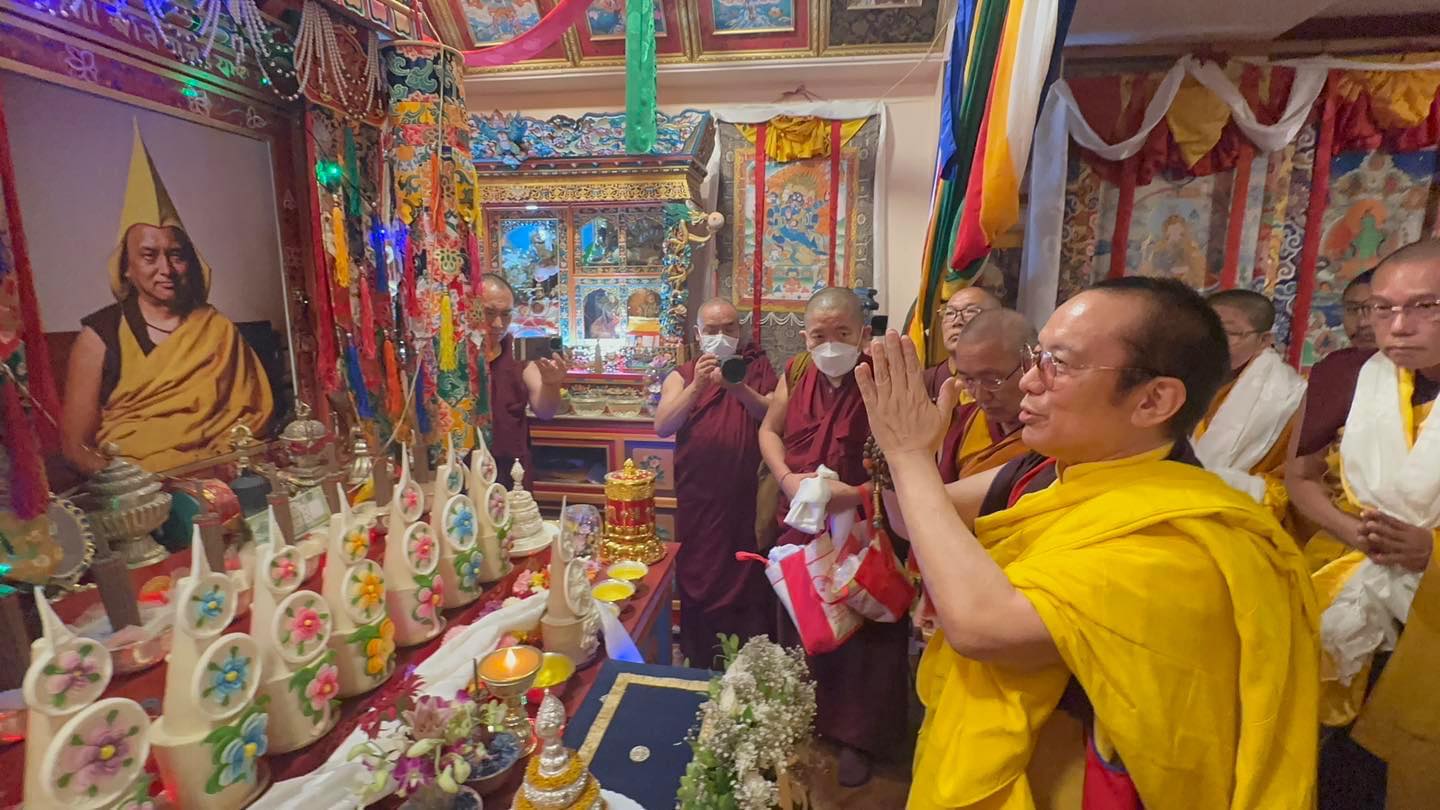
His Eminence the 12th Jamgon Kenting Tai Situ Rinpoche offering prayers and a heartfelt conversation with Lama Zopa Rinpoche, in front of Rinpoche’s holy body.
On May 14, 2023, His Eminence the 12th Jamgon Kenting Tai Situ Rinpoche, visited Kopan Monastery to pay his respects to Lama Zopa Rinpoche and offer prayers in front of Rinpoche’s holy body. The Tai Situ lineage is one of the oldest reincarnation lineages in the Kagyu school and H.E. Tai Situ Rinpoche is also considered to be an emanation of the bodhisattva Maitreya.
H. E. Tai Situ hadn’t been in Nepal for over thirty years, but came for one day to visit one of his gurus who is very sick in the hospital. Thousands of people were waiting for him at the airport when he landed in Nepal. When he arrived at Kopan Monastery to pay respects, there was a huge storm, including hail and lightning, and some felt this was a very auspicious sign, as if the elements were acknowledging the pure samaya between the two lamas.
H. E. Tai Situ took his time in the gompa, telling stories for those in attendance in a very warm way. When he entered Lama Zopa Rinpoche’s room, he stayed standing in front of Rinpoche’s holy body for a long time, having what seemed to be a direct conversation with Rinpoche, as though he was right there.
We now have an edited video to share with you, complete with English subtitles, of this heartfelt talk with Lama Zopa Rinpoche: https://youtu.be/aI9T9sHtcxA
- Tagged: tai situ rinpoche
- Home
- News/Media
- Study & Practice
- About FPMT Education Services
- Latest News
- Programs
- New to Buddhism?
- Buddhist Mind Science: Activating Your Potential
- Heart Advice for Death and Dying
- Discovering Buddhism
- Living in the Path
- Exploring Buddhism
- FPMT Basic Program
- FPMT Masters Program
- FPMT In-Depth Meditation Training
- Maitripa College
- Lotsawa Rinchen Zangpo Translator Program
- Universal Education for Compassion & Wisdom
- Online Learning Center
- Prayers & Practice Materials
- Overview of Prayers & Practices
- Full Catalogue of Prayers & Practice Materials
- Explore Popular Topics
- Benefiting Animals
- Chenrezig Resources
- Death & Dying Resources
- Lama Chopa (Guru Puja)
- Lama Zopa Rinpoche: Compendium of Precious Instructions
- Lama Zopa Rinpoche: Life Practice Advice
- Lama Zopa Rinpoche Practice Series
- Lamrim Resources
- Mantras
- Prayer Book Updates
- Purification Practices
- Sutras
- Thought Transformation (Lojong)
- Audio Materials
- Dharma Dates – Tibetan Calendar
- Translation Services
- Publishing Services
- Teachings and Advice
- Find Teachings and Advice
- Lama Zopa Rinpoche Advice Page
- Lama Zopa Rinpoche: Compendium of Precious Instructions
- Lama Zopa Rinpoche Video Teachings
- ༧སྐྱབས་རྗེ་བཟོད་པ་རིན་པོ་ཆེ་མཆོག་ནས་སྩལ་བའི་བཀའ་སློབ་བརྙན་འཕྲིན།
- Podcasts
- Lama Yeshe Wisdom Archive
- Buddhism FAQ
- Dharma for Young People
- Resources on Holy Objects
- Ways to Offer Support
- Centers
- Affiliates Area
- Teachers
- Projects
- Charitable Projects
- Make a Donation
- Applying for Grants
- News about Projects
- Other Projects within FPMT
- Support International Office
- Projects Photo Galleries
- Give Where Most Needed
- FPMT
- Shop
Translate*
*powered by Google TranslateTranslation of pages on fpmt.org is performed by Google Translate, a third party service which FPMT has no control over. The service provides automated computer translations that are only an approximation of the websites' original content. The translations should not be considered exact and only used as a rough guide.Whatever problem one experiences if one thinks about the benefits of problems and how they are beneficial for ones own life, to develop ones mind in compassion, to develop loving kindness, patience, wisdom, and all the positive qualities for the path to liberation. By thinking of the benefits one develops this precious quality, this most healthy positive way of thinking that brings happiness and that stops you from harming yourself and stops you from harming others.







